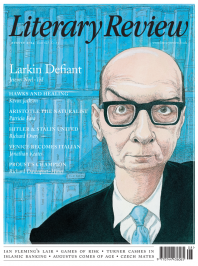Eric Ormsby
Studying the Sharia
Misquoting Muhammad: The Challenge and Choices of Interpreting the Prophet’s Legacy
By Jonathan A C Brown
Oneworld 361pp £25
In this erudite and provocative new book Jonathan Brown has set out to compose ‘a sort of paean to an intellectual and religious tradition that nurtured a light of wisdom not only for its own adherents but for outsiders as well’. This is a bold ambition, for the tradition Brown comes to praise is that of the Sharia, specifically in its Sunni form. True, the vast and intricate body of jurisprudence, elaborated for well over a millennium by Muslim legal scholars – jurists and exegetes known as the ulama – offers much to admire. In its intellectual rigour, the subtlety of its logical distinctions, and its sheer ingenuity in making sense of often abstruse and contradictory premises, it does represent a formidable achievement. Even so, on the evidence Brown presents, often in great detail, the ‘light of wisdom’ – or even the lesser light of common sense – is not conspicuous among its offerings. There is a good reason for this. The Sharia draws on the allied sources of the Koran and the Traditions of the Prophet, those voluminous accounts of Muhammad’s words and deeds known as the hadith. These traditions are the basis of the Sunna, a code of comportment derived from Muhammad’s example that all right-thinking Muslims are enjoined to imitate. The ability to derive and to formulate valid legal rulings from this mass of material, much of it of dubious provenance, as well as from the frequently obscure verses of the Koran, constitutes a massive challenge. That the ulama succeeded in doing just this, amid great diversity of interpretative opinion and endless wrangling, stands as a tribute to their considerable exegetical sophistication as well as to their sheer tenacity.
The alim (the singular form of ulama in Arabic) was the man of knowledge, the possessor of ilm (‘sacred knowledge’ in this context) and, as such, had to master a number of disciplines within the ‘sciences of religion’: not only the huge body of canonical traditions in their thousands, but

Sign Up to our newsletter
Receive free articles, highlights from the archive, news, details of prizes, and much more.@Lit_Review
Follow Literary Review on Twitter
Twitter Feed
Though Jean-Michel Basquiat was a sensation in his lifetime, it was thirty years after his death that one of his pieces fetched a record price of $110.5 million.
Stephen Smith explores the artist's starry afterlife.
Stephen Smith - Paint Fast, Die Young
Stephen Smith: Paint Fast, Die Young - Jean-Michel Basquiat: The Making of an Icon by Doug Woodham
literaryreview.co.uk
15th-century news transmission was a slow business, reliant on horses and ships. As the centuries passed, though, mass newspapers and faster transport sped things up.
John Adamson examines how this evolution changed Europe.
John Adamson - Hold the Front Page
John Adamson: Hold the Front Page - The Great Exchange: Making the News in Early Modern Europe by Joad Raymond Wren
literaryreview.co.uk
"Every page of "Killing the Dead" bursts with fresh insights and deliciously gory details. And, like all the best vampires, it’ll come back to haunt you long after you think you’re done."
✍️My review of John Blair's new book for @Lit_Review
Alexander Lee - Dead Men Walking
Alexander Lee: Dead Men Walking - Killing the Dead: Vampire Epidemics from Mesopotamia to the New World by John Blair
literaryreview.co.uk